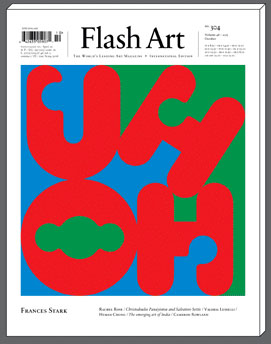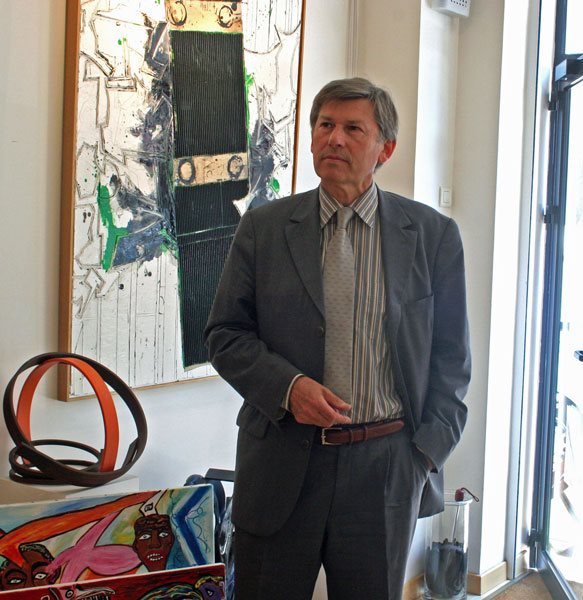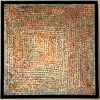Flash Art International no.304 October 2015
We are pleased to announce that the October issue of Flash Art International is out now.
Coinciding with the opening of “UH-OH,” Frances Stark’s midcareer retrospective at the Hammer Museum in Los Angeles, the new issue of Flash Art features a cover designed by the artist. Known since the start of her career for text-based work, Stark has increasingly employed typefaces to innovative and idiosyncratic effect, in pursuit of what has sometimes been identified as “writing in space.” The font Airsoft, developed together with her longtime collaborator Chris Svensson, appears here in a reworking of Robert Indiana’s iconic LOVE image of 1965, which itself made the leap from a MoMA Christmas card to a case of writing in space, rendered as sculpture at sites around the world.
In a featured essay Flash Art US Editor Eli Diner highlights the depictive qualities, the cleverness and invention of Stark’s processes of self-figuration and self-portrait: “She has set an ongoing narration of the process and the travails of making art and living as an artist and making a living as an artist in a perpetual present tense: depictions of what’s going on right now — personally, professionally and in the world as glimpsed from her studio or home.” — Eli Diner
Also, in this issue:
| Beau Rutland describes the skillful facture, playful wit and unassuming topicality of Rachel Rose’s videos. “Rose creates spaces that look so much like our everyday lives, yet have been slightly augmented, perhaps with an unexpected jump cut to seemingly unrelated found footage.”
— Beau Rutland Two recent exhibitions have invited a reconsideration of the institutional narratives associated with the scientific discipline of archaeology: Christodoulos Panayiotou’s “Two Days after Forever,” hosted by the Cyprus Pavilion at the 56th Biennale di Venezia; and the “twin” exhibitions “Serial Classic” and “Portable Classic,” co-curated by Salvatore Settis and held at the Milan and Venice venues of the Fondazione Prada. In conversation, Panayiotou and Settis contemplate the authority of ancient art and the many challenges that a political understanding of archaeology can pose. Carlos Fonseca digs into the spectral echoes of the avant-gardes that populate Valeria Luiselli’s novels. “Luiselli is a writer who has undertaken the project of rewriting the Latin American literary tradition purged of the ambitions — or pretensions — of representing the histories, moods and pathologies of an entire continent.” — Carlos Fonseca Ruba Katrib surveys the art of Heman Chong, who questions the conventions of contemporary art reception, combining them with popular narrative forms like film and novels. “Chong carefully dissects and aggregates information, letting associations run wild. He presents partial threads of communication, disperses authorship and creates situations.” — Ruba Katrib Veeranganakumari Solanki introduces the emerging Indian artists Nandan Ghiya, Sahej Rahal, Prabhakar Pachpute, Tanmoy Samanta, Rathin Barman, Prajakta Potnis, Hemali Bhuta, and Shreyas Karle. Kari Rittenbach discusses the authorial non-production in the work of Cameron Rowland. “Rowland’s examination of received standards stresses the deeply rooted injustice of American exceptionalism, drawing attention to the structural artifice of the white cube and the system of white-supremacist patriarchy in which the whole of high cultural production is circumscribed.” — Kari Rittenbach In Arena: Sadie Coles, London; Eugene Tan on the National Gallery, Singapore; Robert Walser’s Looking at Pictures by New Directions; Charles Esche on the 2015 Jakarta Biennale; Angel Haze; Wim Peeters on Office Baroque, Brussels; Melanie Bühler on Lunch Bytes; Elysia Crampton. And finally, in Reviews: Sarah Charlesworth at the New Museum, New York; Sarah Ortmeyer at Bodega, New York; Keren Cytter at the Museum of Contemporary Art, Chicago; “Theories on Forgetting” at Gagosian Gallery, Los Angeles; A.L. Steiner at Blum & Poe, Los Angeles; Teresa Burga at the Museo de Arte Latinoamericano, Buenos Aires; Eloise Hawser at the ICA, London; “The Boys, the Girls and the Political” at Lisson Gallery, London; “After Babel” at Moderna Museet, Stockholm; Mathieu Malouf at Lars Friedrich, Berlin; Bill Lynch at Tanya Leighton, Berlin; Lawrence Abu Hamdan at the Kunst Halle Sankt Gallen; Tony Oursler at Luma Foundation, Arles; Fausto Melotti at the NMNM, Monaco; “La Grande Madre” at Palazzo Reale, Milan; “Bartered Collection” at Mumbai Art Room; Ming Wong the Ullens Center for Contemporary Art, Beijing; Dinh Q. Lê at the Mori Art Museum, Tokyo. |

















